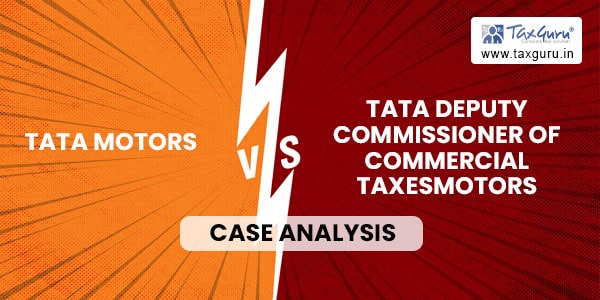FACTS AND BACKGROUND
In the 2004 case of Ekram Singh, it was held that if a defective part arises and a warranty situation arises, the manufacturer’s credit note is taxable. The credit note has to be issued by the manufacturer to the dealer of automobiles. This will only happen if there is a replacement to be made. The judgement was rendered, and a three-judge bench was set up to measure the Ekram case’s correctness. Before setting up this case, thirty- four similar cases were already pending before the Supreme Court. To discuss and analyse the issues, the case of M/s Marudhara Motors was taken up. There was no ‘interference’ by the Ekram case in the current case.
M/s Marudhara Motors is the dealer, and Tata Motors is the manufacturer. M/s Marudhara Motors makes and enters into agreements and contracts on behalf of Tata Motors. The business involves buying and selling vehicles and automobiles, including spare parts. If a part is defective, the dealer provides the customers or the clients with a free replacement. If the product is under warranty, the damaged part is replaced with a new one. The replacement parts are usually available in stock. If not available, then the dealer procures them from the manufacturer. The dealer’s spare parts were used to avoid a possible delivery delay and inconvenience to the customer. In the end, credit notes were issued by the manufacturer to the dealer. The value of the credit note was the same as the cost of the defective replacement parts. The warranty agreement which was signed was different from the original agreement. Every customer had an individual warranty agreement with the dealer. The Rajasthan Sales Tax Act of 1994 has provisions concerning reassessment. The Rajasthan State Board took up the matter. On 5 December 2019, a division bench passed a Reference Order.

ISSUES
- Can credit notes be treated as a mode of payment or not?
- Whether a credit note issued by a manufacturer to a dealer of automobiles in consideration of the replacement of a defective part in the automobile sold according to a warranty agreement being collateral to the sale of the automobile is exigible for sales tax under the sales tax enactments of the respective States?
HELD/ JUDGEMENT
The court adjudicated that there can be a total of three scenarios:
- Firstly, the dealer may request the manufacturer to provide spare parts. The manufacturer may give the dealer the parts to be replaced without the involvement of a third party.
- Secondly, the spare parts may be bought from the market (including paying taxes) by the dealer and replaced by the faulty parts.
- Finally, the dealer’s spare parts may replace the damaged parts.
In the first two cases, the dealer is compensated by the manufacturer in the form of a credit note. The definition of sale (as given in the ‘Sale of Goods Act 1930’) was emphasised.
Consideration is imperative in any contract. If the two parties are unrelated, then taxes cannot be imposed on both parties. If the parties are related, taxes can be imposed on both parties. In case law, there may or may not be a relationship between the manufacturer and the dealer. This differs on a case-to-case basis. The inclusion of a third party means that there is no relation. For example, if a service is provided by a party to the other party and there is no consideration, then taxes will be imposed. The term ‘valuable consideration’ has yet to be defined in the current case. There may be many diverse interpretations and meanings of ‘valuable consideration’. In most contracts, consideration is related to ‘monetary value’. In the current case, it was adjudicated that a credit note has a pecuniary value attached to it. The court broadened the scope and meaning of ‘valuable consideration’ by terming the credit note as ‘price’. If, for replacement, the manufacturer bought parts from the market, then the manufacturer would have to incur tax costs. In the case of a warranty, the dealer acts as a middleman on behalf of the manufacturer, but this does not exempt the matter from tax imposition.
IMPLICATIONS UNDER GST RULES
There were much contradicting and conflicting judgements concerning whether or not a warranty should be a separate agreement between the parties. In some cases, it was argued that the warranty cost was encompassed within the original transaction of the automobile purchase agreement. This made the warranty compulsions free of cost. There may be repercussions for those who have had judgements in their favour. GST liability cannot be ruled out as held in the case. Sale has not been defined as per the GST law. Section 34 of the GST Act has rules and regulations concerning credit and debit notes. To avoid further misperception among the parties of a case, terms like ‘sale’ and ‘valuable consideration’ could be added to the GST Act. This would help improve the clarity of judgement of the judges as well as aid in clarifying the arguments of the counsels.
REFERENCES
- SCC Online- Original Judgement
- Indian Litigation Alert (23 May 2023)- Mondaq
- Tax Flash News- KPMG LLP




